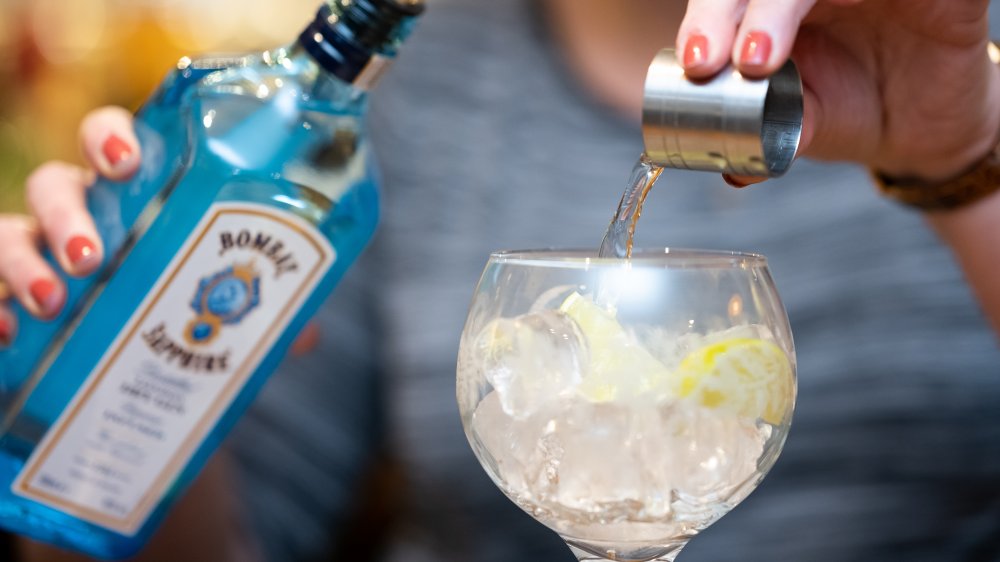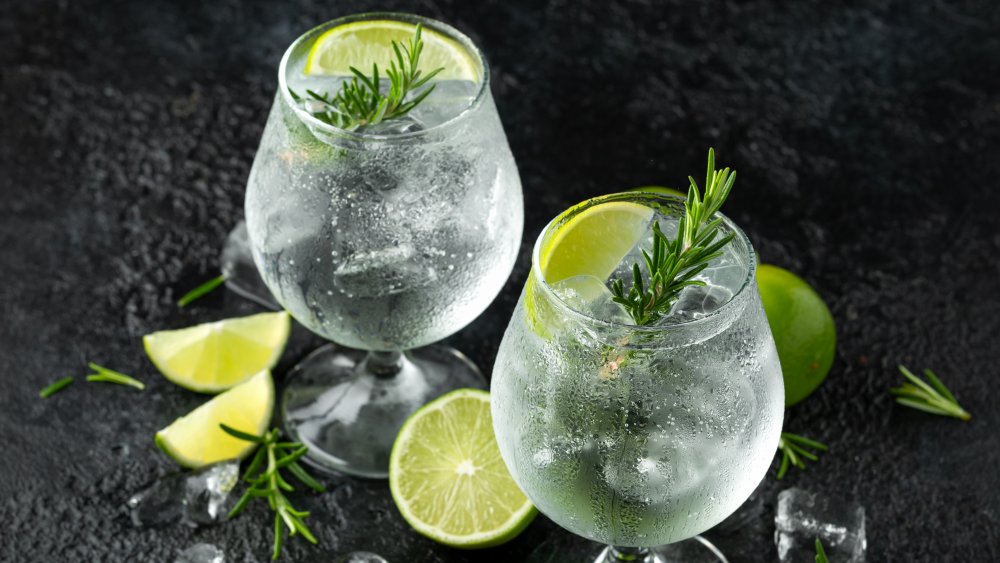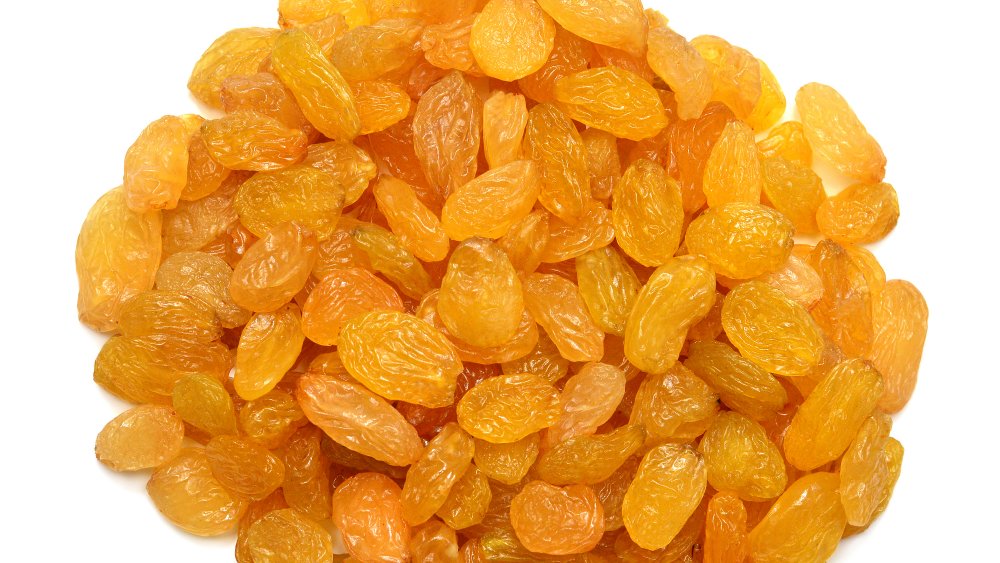Here's What Happens When You Drink Gin Every Day
If there is one takeaway from reading the likes of Hemingway and F. Scott Fitzgerald, it's this: they liked to drink. A lot. And gin was one of the favored alcohols that made appearances in their books like it was an important character. One of Hemingway's characters has a Montgomery Martini (15 parts gin to 1 vermouth) in Across the River and Into the Trees (via Food Republic). The author of The Great Gatsby called gin his beverage of choice because he didn't think anyone could smell it on his breath (via NPR). Did the Lost Generation know something about this alcohol we don't? Maybe. And maybe they just liked to drink.
Gin comes from the juniper berry, and juniper must be the main flavor of this booze in order for it to be legally called gin (via Crafting Club). It turns out this juniper drink may have some health benefits. However, before we launch into those, we are not advocating for a daily gin and tonic, and if you are going to drink it, do so responsibly. With that PSA in mind, what might happen if you drink gin on a daily basis?
It may be the magic elixir for your foundation of youth
Juniper berries have been around forever and have quite the history for their medicinal purposes as well as their use in the kitchen to add flavor to a variety of foods and drinks (via Healthline). Their presence in our beloved gin may account for some of the potential benefits that may come from drinking it, beginning with our vanity. That's right – drinking gin might aid in preventing unwanted wrinkles thanks to the juniper berry's rich antioxidants (via Business Insider). So maybe it's bottoms up for smoother skin.
Gin might also put a damper on those summer allergies. Are you tired of watery, red eyes that make you look like you've been bawling for hours, accompanied by other symptoms that mimic a cold? According to Good to Know, drinking gin in the summer months is thought to be less likely to trigger the runny nose and cough that accompany hay fever than drinking a beverage that's higher in histamine content such as cider or beer. Add in a few herbs and some ginger to your favorite gin, and this concoction may get you through sore throat season, too (via Gin and Tonicly).
Gin may help you avoid weight gain
Per Livestrong, gin is also low in calories, which is good for the waistline. At just 97 calories a shot, it is considered one of the least calorie-laden alcohols you can drink. However, unless you are drinking it straight, the calories in mixers like tonic water can significantly increase your intake. Livestrong cited the popular Schweppes Tonic Water, which clocks in at 130 calories for 12 ounces. That more than doubles the calories of your G&T. It's also important to note that even by itself, gin is giving you empty calories – devoid of nutritional value. Drinking it regularly can make you gain weight over time if you're not careful.
But because this adult beverage is naturally low in sugar, it's a better choice than higher-calorie alternatives if you are drinking with friends. Whether you are a Tanqueray fan or walk on the wild side with a shot of Bombay Sapphire gin or play it cool with Sipsmith, just remember to skip the mixers and your body will thank you when you step on the scale. Plus, gin might also help reduce bloating. How so? Juniper berries are a diuretic, making you take more bathroom breaks. But you won't retain as much water, making you less bloated.
It may add years to your life if you are male
Gin and Tonicly suggests that gin actually helps with blood circulation, which apparently can be beneficial in adding a few years to your life. Per the Daily Mail, a 2020 study published in the journal Age and Aging also indicates that drinking gin may increase longevity. Well, at least the possibility exists if you are male. A researcher named Dr. Piet A. van den Brandt is quoted as saying, "We found alcohol intake was positively associated with the probability of reaching 90 years of age in both men and women. Wine consumption was associated with women reaching 90 but not with men. Instead, intake of gin, brandy, and whiskey increased their longevity."
One possible explanation is that exposure in small doses is beneficial while binge-drinking gin would be toxic, which would make it a specific example of a broader phenomenon called hormesis. But van der Brandt also cautioned readers not to confuse living longer with being healthy and said the study's findings shouldn't be used as a justification to drink. It may also be dangerous for people who are on medications. It's also important to remember the old adage, correlation does not equal causation. Live Science argues that in studies linking alcohol to longevity, it may be that healthy people are able to drink for longer in life and not the other way around.
Gin-soaked raisins may ease aches and pains
Gin may also help relieve joint pains and aches. Per Fox News, gin-soaked raisins have long been a part of folk medicine, but eating them has supposedly worked for some who suffer from arthritis. The raisins must be golden and must soak in gin for a week before you begin a daily regimen. Ten gin-soaked raisins each day is the prescribed amount, but don't consume any dose without consulting a doctor. This is an unproven remedy, but if effective, it could indeed be gin's raison d'etre.
Gin may also help with digestion and heartburn. According to Gin and Tonicly, the bitters used in this favored booze help increase digestive enzymes that break foods down and can deter the discomfort in your chest associated with the dreaded heartburn. The evidence is only anecdotal, and regular alcohol consumption may actually worsen heartburn, so don't go trying to use it to replace your antacids. Gin might sound like miracle booze with all of its alleged benefits. But it's important to remember that it's an alcoholic beverage, and drinking too much alcohol can have disastrous consequences in the short and long term.




